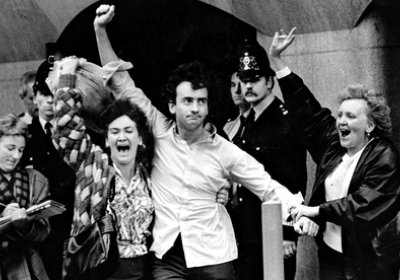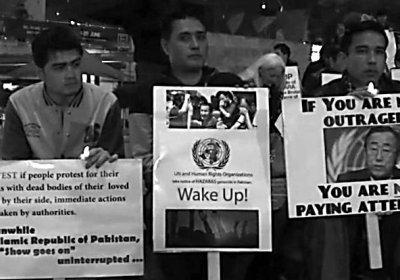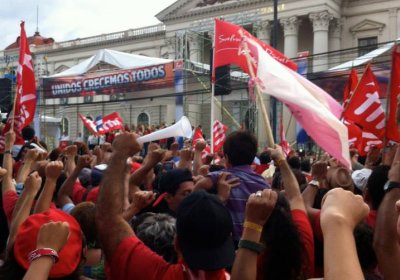“When Gerry Conlon, who has died aged 60 of lung cancer, met survivors of the US's Guantánamo Bay detention camp, he found that their 21st-century experiences mirrored his in the 1970s,” The Guardian wrote about the Belfast-born Conlon who passed away on June 21.
He spent more than 14 years in jail from 1974-1989 after being found guilty by British authorities for pub bombings in Guilford that he did not commit.
International solidarity
Dr Chee Soon Juan, secretary-general of the Singapore Democratic Party (SDP), has been arrested and jailed several times for holding demonstrations and for making public speeches critical of Singapore's ruling People's Action Party (PAP) government.
So apparently there is a crisis in Iraq. Really, who could have predicted this? Who among us could possibly have guessed a full-scale invasion and occupation of the country, destruction of its infrastructure and society leading directly to the deaths of at least 1 million people could have actually led to such problems?
More than half a million Iraqis have been displaced and hundreds killed after the fall of Iraq's second largest city of Mosul to Islamic fundamentalists. But even as the crisis in Iraq dramatically worsens, Australia is refusing to offer any reprieve for the thousands of Iraqi refugees in its care.
Members of the Hazara community held a vigil in Melbourne on June 15 for the victims of the Taftan bombing in Pakistan.The bombing was part of ongoing attacks on Hazara people and Shia Muslims in Pakistan.
Ali Haider, a member of the Hazara community in Melbourne, said: "A bombing took place [on June 8] in which 30 people were killed and more than 50 injured. These were poor people on pilgrimage."
Colleen Hartland from the Greens called for the Australian government to accept refugees from Pakistan.
We, the undersigned parties and organisations in the Asia region, condemn the moves by the United States government to impose sanctions on Venezuelan citizens it deems to have “abused human rights”.
The US House of Representatives’ May 28 vote for such sanctions is a violation of the right of all nations to sovereignty and self-determination.
“On June 1, 2014, Salvador Sanchez Ceren, historic leader of the Frente Farabundo Martí para la Liberacion Nacional (FMLN), was inaugurated as President of El Salvador,” CISPES.org said on June 3.
There are plenty examples of sporting “droughts”, but there has never been a more harrowing athletic drought — rife with pain, pathos and perseverance — quite like that of the Palestinian national football team.
This is a national team without a recognised nation to call home; a national team that has never qualified for a major international tournament; a national team that, like its people, struggles to be seen. That drought, 86 years in the making, is now over.
“Riot police were on standby as tens of thousands took to the streets in Madrid, Barcelona and other cities across Spain on Monday to demand a vote on whether to rid Spain of its royal family,” Al Jazeera reported on June 3.
The US House of Representatives disregarded regional consensus on May 28 by voting to impose sanctions against Venezuela.
The vote by acclamation was overwhelming, despite a last-ditch appeal by Michigan’s John Conyers and 13 other progressive Democrats who opposed sanctions and called for restoration of diplomatic relations between the two nations.
They pointed out that regional bodies, including the Organisation of American States, the Caribbean Community and the Union of South American Nations (UNASUR), had all rejected the case for sanctions.
The first Free West Papua campaign office in Australia was opened in April in Perth, signalling the growing international campaign for West Papuan self-determination. West Papua has been occupied by Indonesia since the 1960s, despite an ongoing struggle for independence.
Benny Wenda, a leader of Free West Papua living in exile, said he hoped the Australian government would withstand pressure from Indonesia over the office opening.
It seems to have been decided that the best response to the success of Nigel Farage, the leader of the UK Independence Party that won 27.45% of the vote in the May European elections, is to try to copy him.
The Tories will soon reveal that one of their councillors declared that “the shape of a Romanian’s spine proves he’s actually a type of stinging nettle” on an election leaflet, but it was a mistake anyone could make, especially as the councillor had an earache at the time.
- Previous page
- Page 165
- Next page









